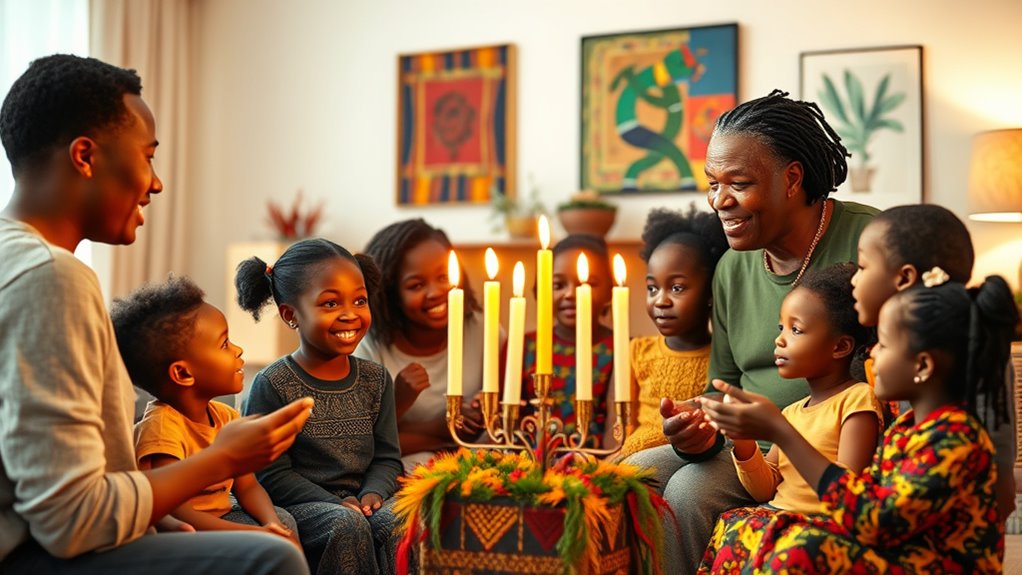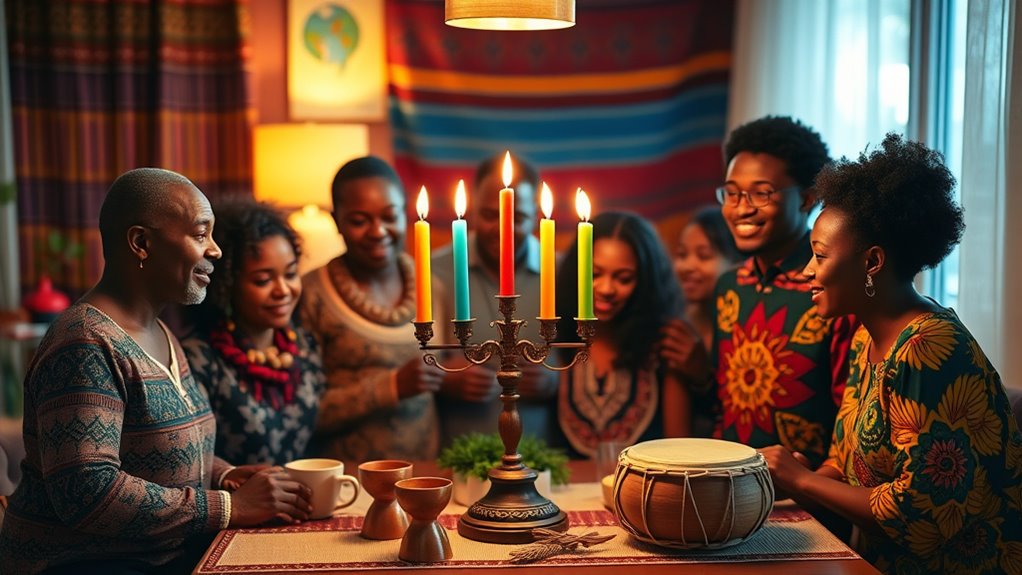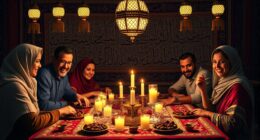Kwanzaa principles offer modern families and businesses a meaningful way to honor African heritage and strengthen community bonds. By embracing values like Umoja (unity), Kujichagulia (self-determination), and Ujima (collective work), you can promote harmony, self-awareness, and shared growth. These principles inspire you to act intentionally, support others, and preserve cultural traditions in everyday life. Continuing to explore these principles can help you apply them meaningfully to your personal and professional communities.
Key Takeaways
- Kwanzaa principles like Umoja, Kujichagulia, and Ujima promote family unity, self-identity, and collective action, applicable in both personal and business contexts.
- Incorporating Kwanzaa values into family and business fosters cultural pride, community support, and ethical decision-making.
- Modern families and businesses can use Kwanzaa principles to build inclusive environments that emphasize shared responsibility and mutual growth.
- Applying principles like Ujima encourages collaborative efforts in family projects or business ventures for collective success.
- Teaching Kwanzaa’s core values helps families and businesses uphold cultural heritage while inspiring social responsibility and empowerment.

Have you ever wondered what principles underpin Kwanzaa, a celebration rooted in African heritage and community? These principles serve as the foundation for understanding its deeper meaning and cultural significance. Kwanzaa isn’t just about lighting candles or exchanging gifts; it’s a deliberate reflection of values that strengthen community bonds and foster personal growth. When you participate in Kwanzaa, you’re engaging in community celebrations that honor African traditions and emphasize collective well-being. These celebrations are more than festivities—they’re acts of cultural preservation and reinforcement of shared identity. They remind you of the importance of unity, self-determination, and responsibility within your community, making the holiday a powerful tool for cultural continuity.
The principles of Kwanzaa are designed to guide behavior and inspire personal and communal development. Each day of the week-long celebration focuses on one of these core values, such as Umoja (Unity), Kujichagulia (Self-Determination), and Ujima (Collective Work and Responsibility). These principles aren’t just abstract ideas; they’re actionable ideals that you can embody in everyday life. For example, practicing Umoja encourages you to foster harmony within your family and community, creating a sense of togetherness that sustains everyone through shared efforts and mutual support. Kujichagulia reminds you to define yourself and your community on your own terms, resisting external stereotypes or limitations. Ujima calls for active participation in community projects, ensuring that everyone benefits from collective achievements. Recognizing the significance of cultural heritage helps deepen your understanding of these principles and their origins.
Cultural significance is woven into each principle, anchoring them in a rich heritage that celebrates resilience, history, and identity. When you observe Kwanzaa, you’re acknowledging a legacy of overcoming adversity and building stronger community bonds. These principles serve as a reminder of your role in maintaining and passing down cultural traditions, shaping future generations with a sense of pride and purpose. Community celebrations during Kwanzaa are intentionally inclusive, inviting participation from all ages and backgrounds. Sharing stories, lighting candles, and engaging in communal activities reinforce a collective spirit rooted in these principles. They transform individual actions into a collective effort to uplift and empower the entire community.
Frequently Asked Questions
How Can Busy Families Incorporate Kwanzaa Into Their Holiday Traditions?
You can easily incorporate Kwanzaa into your busy family life by dedicating a few minutes each day to learn about its principles, fostering family bonding and cultural education. Use simple activities like sharing stories, making crafts, or discussing the meaning behind each principle. Light candles together, and reflect on how these values apply to your daily lives. Small, intentional efforts can create meaningful holiday traditions that celebrate heritage and strengthen family connections.
What Are Creative Ways to Teach Children About Kwanzaa Principles?
You can teach children about Kwanzaa principles through fun storytelling activities that highlight each value. Incorporate arts and crafts projects, like making kinara candles or Umoja banners, to make learning interactive. Share stories of cultural significance, encouraging kids to discuss and reflect. This hands-on approach keeps them engaged while helping them understand the principles’ importance in a meaningful, memorable way.
Can Non-African American Families Celebrate Kwanzaa Authentically?
Did you know that over 1 million people celebrate Kwanzaa annually? As a non-African American family, you can celebrate Kwanzaa authentically by embracing its core values and fostering cultural understanding. Inclusive celebrations involve learning about its history, participating in traditional rituals, and honoring the principles collectively. Your genuine interest and respect create an enriching experience, strengthening connections and promoting diversity in your community.
How Does Kwanzaa Differ From Other Winter Holidays?
Kwanzaa differs from other winter holidays through its focus on cultural significance and community values. Unlike Christmas or Hanukkah, it emphasizes seven core principles that guide holiday rituals, celebrating African heritage and unity. You participate in activities like lighting candles and sharing stories that reinforce cultural pride. This holiday encourages reflection on history and collective growth, making it a meaningful celebration centered on identity and community bonds.
Are There Modern Adaptations of Kwanzaa Symbols for Today’S Families?
You’ll find modern symbols and digital adaptations of Kwanzaa that resonate with today’s families. For example, digital candles or virtual kinara setups allow you to celebrate online, especially when family members are apart. Some families use social media to share daily reflections on the principles, while others create digital art or videos inspired by traditional symbols. These adaptations help keep the spirit of Kwanzaa alive in a contemporary, connected world.
Conclusion
By embracing the principles of Kwanzaa—unity, self-determination, collective work, cooperative economics, purpose, creativity, and faith—you foster stronger family bonds, build resilient communities, and nurture meaningful traditions. You celebrate your heritage, empower one another, and inspire future generations. You commit to growth, to connection, to progress. You honor your roots, uplift your spirit, and create a legacy rooted in love and purpose. In doing so, you transform your family and community, year after year.









